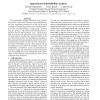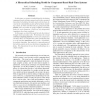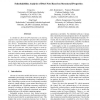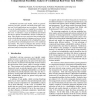85
Voted
RTSS
2002
IEEE
15 years 5 months ago
2002
IEEE
The schedulability analysis problem for many realistic task models is intractable. Therefore known algorithms either have exponential complexity or at best can be solved in pseudo...
108
click to vote
ICRA
2003
IEEE
15 years 5 months ago
2003
IEEE
— Multiple, independent robot platforms promise significant advantage with respect to robustness and flexibility. However, coordination between otherwise independent robots req...
DATE
2003
IEEE
15 years 5 months ago
2003
IEEE
1 We present an approach to schedulability analysis for the synthesis of multi-cluster distributed embedded systems consisting of timetriggered and event-triggered clusters, interc...
IPPS
2006
IEEE
15 years 6 months ago
2006
IEEE
In this paper, we propose a methodology for developing component-based real-time systems based on the concept of hierarchical scheduling. Recently, much work has been devoted to t...
79
Voted
IPPS
2006
IEEE
15 years 6 months ago
2006
IEEE
The recurring real-time task model was recently proposed as a model for real-time processes that contain code with conditional branches. In this paper, we present a necessary and ...
88
Voted
ACSD
2006
IEEE
15 years 6 months ago
2006
IEEE
A schedule of a Petri Net (PN) represents a set of firing sequences that can be infinitely repeated within a bounded state space, regardless of the outcomes of the nondeterminis...
113
click to vote
ECRTS
2007
IEEE
15 years 6 months ago
2007
IEEE
Uniprocessor schedulability theory made great strides, in part, due to the simplicity of composing the delay of a job from the execution times of higher-priority jobs that preempt...
120
click to vote
RTAS
2008
IEEE
15 years 6 months ago
2008
IEEE
Message Sequence Charts (MSCs) are widely used for describing interaction scenarios between the components of a distributed system. Consequently, worst-case response time estimati...
101
click to vote
ISORC
2008
IEEE
15 years 6 months ago
2008
IEEE
Conditional real-time task models, which are generalizations of periodic, sporadic, and multi-frame tasks, represent real world applications more accurately. These models can be c...
116
Voted
ECRTS
2008
IEEE
15 years 6 months ago
2008
IEEE
Existing off-line schedulability analysis for real-time systems can only handle periodic or sporadic tasks with known minimum inter-arrival times. Modeling sporadic tasks with fi...




